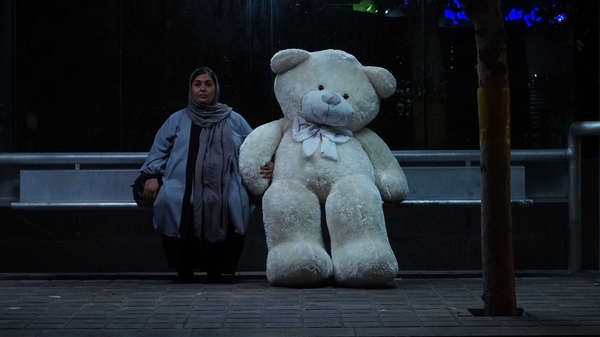The momentum Iranian cinema had in spades at the start of the century has ebbed away over the intervening years, which may just be what happens when a country's filmmaking luminaries die (Abbas Kiarostami), go AWOL (the many Makhmalbafs), are placed under house arrest (Jafar Panahi) or head out of town on starrier business (Asghar Farhadi). Tehran: City of Love, the second feature of the director Ali Jaberansari, may not quite be enough in itself to reverse the trend, but it offers a little nudge that suggests there may be drolly observational life in the industry yet. Jaberansari and co-writer Maryam Najafi introduce us to a trio of crisscrossing lonely hearts who could scarcely be less like the harried, windswept citizens put front-and-centre in Kiarostami's films. They're on What's App, for starters, and are comfortably established in respectable professions; they have the time and freedom to go looking for love rather than, say, friends who've disappeared in earthquakes, or someone who might assist in euthanising them. We rapidly understand the country - or Tehran, at least - has stabilised in recent times; were it not for Panahi's well-documented troubles, we might conclude that its cinema has been gentrified to some degree. One of the characters here comes this close to appearing in a film with Louis Garrel: Jaberansari fashions a nice running gag out of the fact nobody in Tehran really knows who Garrel is, but that joke depends entirely on the film's own audience recognising the tousle-haired Gallic sulker as a talismanic figure in upmarket arthouse circles.
The recent history of Iranian cinema seems to have been less influential on Jaberansari's thinking, all told, than TV sketch shows and the output of certain YouTube channels. This is a skittish film, zapping back-and-forth between the romantic misadventures of comfort-eating receptionist Mina (Forough Ghajabagli), lovesick muezzin Vahid (Mehdi Saki) and hapless personal trainer Hessam (Amir Hessam Bakhtiari), though within these slices of life, Jaberansari's generally fixed camera allows us time to study some spare, choice mise-en-scène. Nothing in the film is sadder and more revealing than the four biscuits - most likely Rich Tea; plain digestives at best - sitting untouched on a plate in Vahid's bachelor pad. The comedy works through accumulation - it grows on you - steered by actors with sharply defined, contrasting presences. Jaberansari has a real asset in Bakhtiari, who sports the hangdog features of Tex Avery's Droopy atop the marbled body of a Charles Atlas model, an unlikely mix-and-match that sustains the film through its lowest-key strand: Hessam's mooning over a fellow bodybuilder, where you wonder just how much musclebound longing a filmmaker can sneak past the Iranian censors nowadays. Saki is never funnier than when moping his way through the mosque's phys-ed program, although Vahid's midfilm effort to relaunch himself as a wedding singer with a repertoire of exclusively downbeat standards runs it a close second. Such turns explain why the film has performed modestly well in those cinemas that have so far booked it: it's at once more accessible than the Iranian cinema of yore, which demanded patience, where Jaberansari cuts freely around, goes for laughs, and insists on looking on the bright side even as his perennial singletons pass into another long, dark night of the soul. Nothing revolutionary - it's too blithe for that - but it has spark and character, which are appealing qualities on a movie night, as they would be on any other date.
Tehran: City of Love is now playing in selected cinemas, and streaming via Curzon Home Cinema.

No comments:
Post a Comment